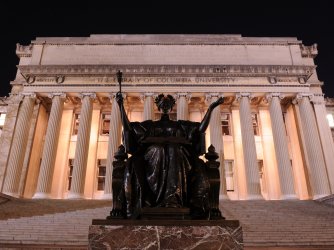Table of Contents
Practical Advice for Fraternities Caught in the Battle for Free Speech on Campus
I. Introduction
While there is no shortage of free speech battles on college campuses, fraternities have the dubious honor of being at the center of many of the least sympathetic controversies. From Halloween parties where brothers show up dressed as Ku Klux Klan members to fraternity newsletters that graphically relate a brother’s sexual exploits with named co-eds, fraternities sometimes express themselves in ways that are not exactly likely to win the battle for hearts and minds. However, although fraternities may later regret the actions of some of their brothers, they must not allow their rights to be stripped away by overzealous or opportunistic administrators. The freedoms of all college and university students may rest on fraternities’ willingness to stand up for their rights. [1]
The following piece is not primarily a legal article. Rather, it focuses on practical advice the Foundation for Individual Rights in Education (FIRE) can offer after years of fighting for free speech on campus. Based on FIRE’s observation that fraternities repeatedly make the same kinds of mistakes, this article is an effort to guide fraternities on what to do when a free speech controversy arises. It is also an effort to recruit fraternities for a war that so many have found themselves drafted into unwillingly: the ongoing war for free speech on campus.
II. Tips on how to be prepared for a free speech battle with a university
1. Remember that assaults on fraternities’ right of free speech are part of a larger problem on campus.
Fraternities are by no means alone in having their rights abridged. A quick examination of FIRE’s website (www.thefire.org) or the Student Press Law Center (www.splc.org) demonstrates the pervasiveness of assaults on free speech on campus. Many of these controversies are downright absurd, such as Gonzaga University’s decision to punish the College Republicans for “discriminatory” language after they used the word “hate” on a flyer advertising a lecture by author Daniel J. Flynn, whose recent book was entitled “Why the Left Hates America”; or Texas Tech University’s establishment of a “speech zone” that restricted free expression for the University’s 28,000 students to one 20-foot-wide “Free Speech Gazebo.” These cases, along with dozens of others, demonstrate that many universities are not, even minimally, living up to the ideals of truly open and free-flowing expression on which an intellectually robust university depends.
2. Stand up for free speech on campus, even when your fraternity is not in trouble.
Free speech is too often taken for granted until an organization faces a challenge to its own existence. Beyond the obvious good of defending one of our country’s deepest principles, a fraternity advocating free speech as one of its causes achieves additional benefits both for the fraternity and for the university as a whole. First, it provides an opportunity to educate brothers about free speech, its parameters, its limits, and common controversies that have arisen. At the same time, it provides an opportunity to remind brothers that the right to engage in a particular form of expression does not make that expression wise or good. Although “offensive” expression is protected by the First Amendment, brothers will learn from accounts of previous fraternity speech controversies that it may subject a fraternity to unwanted public scorn or embarrassment. These lessons may help prevent potentially troublesome situations in the future.
Second, successfully defending against an attack on the free speech rights of other groups may prevent administrators from attempting to use similar tactics in the future. For example, in 2003, the University of California at Irvine shut down the College Republicans' “affirmative action bake sale”—a widely-used political protest parodying affirmative action policies—arguing that it was a form of “discrimination.” Regardless of what one thinks about the propriety of such protests, the “bake sale” was a fully-protected form of political satire and not “discrimination” in any legal sense. FIRE intervened by writing to the university and explaining why UCI’s actions violated both the letter and spirit of the First Amendment and bringing the case national media attention. A few months after FIRE’s intervention, the College Republicans held the sale again, and instead of official repression, the bake sale was allowed to proceed without administrative intervention. After a brief and public outcry against its actions, UCI learned it could not use “discrimination” as a back door to censorship. By intervening in such free speech controversies, fraternities can educate their university that commonly-used tactics to circumvent free speech rights will not be quietly tolerated. In this way, taking such action may prevent attempts to silence speech in the future.
Third, standing up for others’ rights may mean that the fraternity will not be alone if or when it needs defending. A fraternity that supports a university’s decision to punish the expression of another group will not have a great deal of support when its own rights are challenged. While, legally, the popularity of a particular expression is irrelevant to its protected status, as a practical matter, the support of other groups or the student media can prevent a free speech controversy from mushrooming into a witch-hunt.
Finally, and perhaps most importantly from a legal standpoint, speaking out on such issues may have an additional surprising benefit: it may help secure a chapter’s legal position as an expressive association in the future. A recent federal appeals court ruling, Pi Lambda Phi Fraternity, Inc. v. University of Pittsburgh, 229 F.3d 435 (3rd Cir., 2000), held that fraternities that speak out on issues are more likely to be entitled to free association protection than those that do not. In that case, the Third Circuit denied a fraternity the protections afforded to “expressive associations” stating: “Nothing in the record indicates that the Chapter ever took a public stance on any issue of public political, social, or cultural importance” Id at 444. If ever your right to exist on campus is challenged, your position will be greatly enhanced if you have previously taken positions on issues and actively exercised your right to speak. Advocating for free speech is a perfect opportunity to establish your fraternity as an “expressive association.”
III. What to do when a free speech controversy arises
1. When a free speech incident takes place, get organized.
First, get the facts straight. Controversial events often lead to emotionally charged and heated debates that may distort the reality of the incident; thus, establishing and publicizing the facts of what happened before the truth gets obscured by rhetoric are both extremely important. At Georgia State University in 2003, several members of Pi Kappa Alpha painted their faces black for a hip-hop-themed Halloween party for which they dressed as rappers Snoop Dogg and Chingy. According to reports, when other members of the fraternity saw the students, they advised the brothers to remove the paint and the students complied. However, the brothers and the fraternity were punished after fellow students reported the incident to the administration.
During the debate that followed, a group pressing for the fraternity’s removal produced flyers featuring a photograph of another “blackface” incident at Auburn University where a fraternity brother was shown in a Ku Klux Klan robe simulating a lynching of another brother in blackface. The flyers wrongfully implied that the photograph depicted members of Pi Kappa Alpha. With no other information, a student looking at such a flyer would likely accept it as authoritative. However, an honest, early and comprehensive accounting of what took place could preempt such distortions and provide a fraternity with the opportunity to present facts that may paint its actions in a less harmful light. In the GSU case, for example, the fraternity took responsible action and asked the brothers to take off the offensive paint. Facts like these have no bearing on the legal right of the brothers to wear a provocative Halloween costume, but may help convince some students or some administrators to not escalate the situation.
When an incident occurs, a fraternity should conduct a thorough investigation to get as complete a picture of what happened as possible. When it has a reliable set of facts, the group should publicize them in various media. Letters should be written to the campus or local newspaper, the administration, other campus groups, the national organization and alumni. The account should be honest and should not try to hide unpleasant facts. If the group regrets any actions taken by it or its brothers, it may apologize to the offended party; however, the group must also make clear that it remains united and willing to fight any sanctions.
As a note of caution, in our experience, an apology often has little or no effect on the determination of those who wish to see a fraternity disciplined, so one should not expect that even the most contrite statement of regret will make the controversy go away. While apologies are appropriate if the fraternity regrets the actions of its brothers, it is more important to prepare for the upcoming contest by establishing the record and staking its position as soon as possible. If it still looks like a fraternity will be punished once it has taken the above actions, it should submit the case to FIRE at www.thefire.org.
2. Do not accept punishment when the expression in question is protected by the First Amendment.
Once the administration takes action, the fraternity needs to decide how it will respond. It is essential that fraternities not accept illegitimate excuses to punish the content of their expression. The most common approach universities have taken to justify assaults on protected expression is by portraying such expression as a form of “discriminatory harassment” that the university is required to prevent under federal law. Discriminatory harassment is a very specific legal category of punishable conduct that attempts to ensure that all students are provided with access to educational opportunities. It does not give a university the right to prohibit merely “offensive” speech, as often claimed. [2] Abuse of “discriminatory harassment” has been so rampant that, in July 2003, the Department of Education’s Office of Civil Rights (OCR) felt it necessary to release a clarification on the law to universities, explaining that:
[I]n addressing harassment allegations, OCR has recognized that the offensiveness of a particular expression, standing alone, is not a legally sufficient basis to establish a hostile environment under the statutes enforced by OCR… Some colleges and universities have interpreted OCR’s prohibition of “harassment” as encompassing all offensive speech regarding sex, disability, race or other classifications. Harassment, however, to be prohibited by the statutes within OCR’s jurisdiction, must include something beyond the mere expression of views, words, symbols or thoughts that some person finds offensive.
Any accusation against a fraternity for “discriminatory harassment” as defined by Title IX simply because students found a brother’s expression “offensive” is an illegitimate use of federal law and, for the sake of the fraternity and other groups on campus, any punishment based on such a regulation should be rejected.
In addition to the clear statement from OCR, numerous court decisions have enshrined in law what OCR has articulated as policy: that student expression cannot be prohibited or punished as “discriminatory” because it is offensive to other members of the university. The leading case of fraternal speech, IOTA XI Chapter of Sigma Chi Fraternity v. George Mason University, 993 F.2d 386 (4th Cir., 1993), overturned the punishment, under the university’s antidiscrimination policy, of a fraternity that held an “ugly woman contest” in which fraternity members dressed as various offensive and insulting racial- and gender-based caricatures. While the court recognized that a university has a “substantial interest in maintaining an educational environment free of discrimination and racism,” it concluded that “the university should have accomplished its goals in some fashion other than silencing speech on the basis of viewpoint” Id at 393. Another federal court struck down the University of Michigan’s “Policy on Discrimination and Discriminatory Harassment of Students in the University Environment,” holding that “what the University could not do . . . was establish an anti-discrimination policy which had the effect of prohibiting certain speech because it disagreed with ideas or messages sought to be conveyed” Doe v. University of Michigan, 721 F. Supp. 852, 864 (Dist. E.D. Mich, 1989), see also Dambrot v. Central Mich. Univ., 55 F.3d 1177 (6th Cir. 1995); The UWM Post, Inc. v. Board of Regents of University of Wisconsin System 774 F. Supp. 1163 (E.D. Wisc. 1991); Harvey A. Silverglate and Greg Lukianoff, Speech Codes: Alive and Well at Colleges, Chronicle of Higher Education, Aug. 1, 2003 at 7. Policies against “harassment” cannot be used to punish students or organizations, fraternities included, based on the message they convey – even if the message is offensive, crude, insulting, or, indeed, genuinely racist or sexist.
3. Be willing to fight for free speech: you will likely win.
In FIRE’s experience, whether due to a reluctance to defend some of the actions of their brothers. a desire to avoid a confrontation with the administration, or a basic misunderstanding of their rights, fraternities too often do not fight back when universities impose punishment for engaging in protected speech. However, fraternities, their alumni, and their nationals must remember that in our legal system, all citizens only enjoy the rights that the least of us enjoy. Therefore, fraternities need to realize that what might seem like a trivial fight over an offensive Halloween costume may have a profound impact on administrators’ or students’ approaches to dealing with speech in the future.
Fraternities willing to fight for their free speech rights usually prevail. Universities have come to depend on the acquiescence of students when they impose illegitimate sanctions for protected speech. When challenged, however, pressure from the public, the media, alumni, donors, and organizations like FIRE is often enough to force a university to back away from morally and constitutionally objectionable sanctions against students or organizations. When public pressure does not suffice, lawsuits usually do.
In those rare instances where a university has insisted on litigating such cases, they typically lose. The cases cited above are somewhat rare examples of fully-litigated cases involving free speech rights of students. Often when a fraternity or other organization files a lawsuit, the university backs down shortly thereafter. For example, when officials at the University of California Riverside disbanded a chapter of Phi Kappa Sigma for three years after it produced a t-shirt that some Latino students found offensive, the fraternity filed suit. The university quickly reversed the sanctions, settled the lawsuit, and agreed to have two top administrators attend First Amendment “sensitivity training.” Similar scenarios involving fraternities have occurred at Auburn University and Cal State Northridge. When the fraternities filed lawsuits alleging a violation of their free speech rights, the universities readmitted the chapters and settled the lawsuits. Given the clear weight of the law against such unconstitutional policies, one can easily see why universities are so reluctant to take their cases to court.
IV. Conclusion
We have not seen the last time a fraternity gets in trouble for offensive expression, but FIRE hopes that the next time such a controversy arises, the fraternity, its alumni, and national governing body will recognize the importance of protecting the right to free speech. Standing up for free speech in general does not mean the same thing as endorsing the expression itself. Defending expression that is unpopular or that one disagrees with personally requires courage and principle, and is crucial to safeguarding the rights of all students. We hope that by following the advice briefly outlined in this article, fraternities may move away from being the poster children for those who support speech codes, to being positive allies in the fight for free speech.
Greg Lukianoff [3] & Matthew Vasconcellos [4]
[1] A note of caution: some of the analysis that follows concerns primarily fraternities at public colleges and universities. Private schools have greater latitude to restrict otherwise constitutional rights of students. However, students at private schools that claim to value free speech can and should insist on their moral right to free speech, even if their legal rights are in question. Furthermore, private schools also use Title IX’s anti-discrimination clauses as an excuse to punish student speech so the analysis of Title IX applies equally to public and private universities.
[2] The only Supreme Court case that has dealt with student-on-student harassment defined “harassment” as a pattern of behavior “so severe, pervasive, and objectively offensive that it can be said to deprive the victims of access to the educational opportunities or benefits provided by the school” Davis v. Monroe County Board of Education. 526 U.S. 629, 650-651 (1999). In that case, which concerned grade schoolers, the behavior in question included physical and sexual assault.
[3] Greg Lukianoff is an attorney and the Director of Legal and Public Advocacy for the Foundation for Individual Rights in Education (FIRE)
[4] Matthew Vasconcellos is a FIRE Legal Researcher and a student at the University of Michigan Law School
- Free Speech
- Freedom of Association
- Student Rights
- Press Freedom
- Due Process
- Speech Codes
- Harassment
- Halloween
- Litigation
- California State University - Northridge
- University of California - Riverside
- University of Michigan - Ann Arbor
- George Mason University
- Auburn University
- Georgia State University
- University of Pittsburgh
- Texas Tech University
- University of California, Irvine
- Gonzaga University
- University of California at Irvine: Suppression of Affirmative Action Bake Sale
- Texas Tech University: Speech Code Litigation
- Gonzaga University: Censorship of ‘Hate Speech’
Recent Articles
FIRE’s award-winning Newsdesk covers the free speech news you need to stay informed.

Campus encampment bans rarely violate the First Amendment. Here’s why.

University provosts have bleak outlook on free expression in higher ed

With colleges punishing student protesters, campus due process is more important than ever
